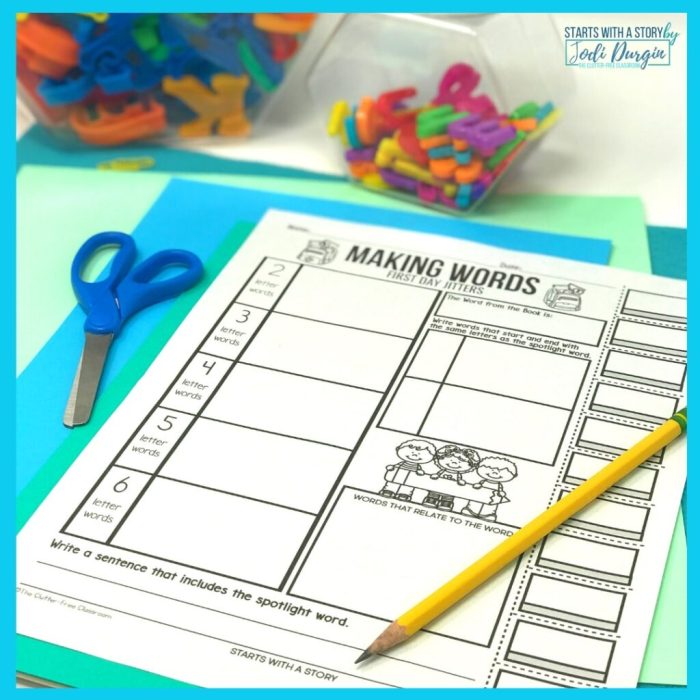First day jitters comprehension questions provide a valuable tool for educators and students to understand and address the common concerns and anxieties associated with the first day of school. These questions facilitate a deeper understanding of the causes, effects, and strategies for coping with first day jitters, fostering a more positive and productive learning environment.
The impact of first day jitters on students’ learning, the role of educators in creating a supportive environment, and case studies of successful interventions are explored in this comprehensive discussion.
First Day Jitters: Understanding, Effects, and Strategies: First Day Jitters Comprehension Questions

First day jitters, a common experience among students of all ages, refer to the feelings of anxiety, nervousness, and apprehension that accompany the start of a new academic year or term. These jitters stem from various factors, including fear of the unknown, uncertainty about social interactions, and concerns about academic performance.
Causes of First Day Jitters
- Fear of the unknown: Students may worry about what to expect in their new classes, teachers, and classmates.
- Uncertainty about social interactions: They may feel anxious about making new friends or fitting in with existing peer groups.
- Concerns about academic performance: Students may be apprehensive about their ability to succeed in their studies and meet the expectations of their teachers.
- Past negative experiences: Previous negative experiences in school or social situations can contribute to first day jitters.
Strategies for Coping with First Day Jitters
To cope with first day jitters, students can employ several strategies:
- Positive self-talk: Replace negative thoughts with positive affirmations, reminding themselves of their strengths and capabilities.
- Visualization: Picture themselves succeeding in their classes and forming meaningful connections with others.
- Deep breathing exercises: Practice deep breathing techniques to calm their nerves and reduce anxiety.
- Seeking support: Talk to friends, family members, or a trusted adult about their feelings and seek encouragement.
Effects of First Day Jitters on Students
First day jitters can significantly impact students’ learning and well-being:
Impact on Learning
- Impaired concentration: Anxiety can interfere with students’ ability to focus and absorb new information.
- Reduced participation: Students may hesitate to ask questions or engage in class discussions due to nervousness.
- Lowered motivation: Extreme anxiety can dampen students’ enthusiasm and motivation to learn.
Manifestations in the Classroom
- Physical symptoms: Sweating, trembling, or increased heart rate.
- Behavioral symptoms: Avoidance of social interactions, fidgeting, or difficulty speaking.
- Cognitive symptoms: Negative self-talk, difficulty concentrating, or memory lapses.
Potential Long-Term Effects, First day jitters comprehension questions
Unresolved first day jitters can have long-term consequences:
- Chronic anxiety: Persistent jitters can develop into a chronic anxiety disorder, affecting students’ overall mental health.
- Academic difficulties: Ongoing anxiety can hinder academic progress and lead to lower grades.
- Social isolation: Extreme anxiety can prevent students from forming meaningful relationships with peers.
Role of Educators in Addressing First Day Jitters

Educators play a crucial role in creating a welcoming and supportive learning environment that mitigates first day jitters:
Creating a Welcoming Environment
- Establishing clear expectations: Provide students with a syllabus and clear guidelines for the course.
- Building relationships: Make an effort to get to know students and create a sense of community.
- Encouraging open communication: Foster an environment where students feel comfortable asking questions and seeking support.
Strategies for Coping with Jitters
- Ice-breaking activities: Use games or activities to help students relax and connect with each other.
- Guided meditation or mindfulness exercises: Teach students techniques to manage their anxiety.
- Peer support: Encourage students to form study groups or connect with classmates who can provide encouragement.
Approaches to Addressing First Day Jitters
| Approach | Description |
|---|---|
| Preventive measures | Implement strategies to reduce anxiety before the first day, such as providing students with information about the course and school environment. |
| Intervention strategies | Provide support and resources to students who experience first day jitters during the first few days of school. |
| Long-term strategies | Create a school-wide culture that promotes mental health and well-being, reducing the stigma associated with anxiety and providing ongoing support for students. |
Case Studies and Examples

Several successful interventions have been implemented to reduce first day jitters:
Case Study: “Peer Buddies” Program
A study conducted in a high school implemented a “Peer Buddies” program, where older students were paired with incoming freshmen to provide support and guidance. The program resulted in a significant reduction in first day jitters and improved social integration for freshmen.
Example: Ice-Breaking Activity
One effective ice-breaking activity involves asking students to write down three interesting facts about themselves on a piece of paper. They then share their papers with a partner and take turns guessing each other’s facts.
Resource List
- National Association of School Psychologists: First Day of School Anxiety: Tips for Students and Parents
- American School Counselor Association: Back-to-School Strategies for Student Success
- National Education Association: Back-to-School Stress Tips for Students and Parents
Detailed FAQs
What are first day jitters?
First day jitters refer to the feelings of anxiety, nervousness, and apprehension commonly experienced by students on the first day of school.
What are the common causes of first day jitters?
Common causes of first day jitters include fear of the unknown, social anxiety, concerns about academic performance, and separation anxiety.
What strategies can students use to cope with first day jitters?
Effective strategies for coping with first day jitters include practicing relaxation techniques, positive self-talk, visualizing success, and connecting with peers.
